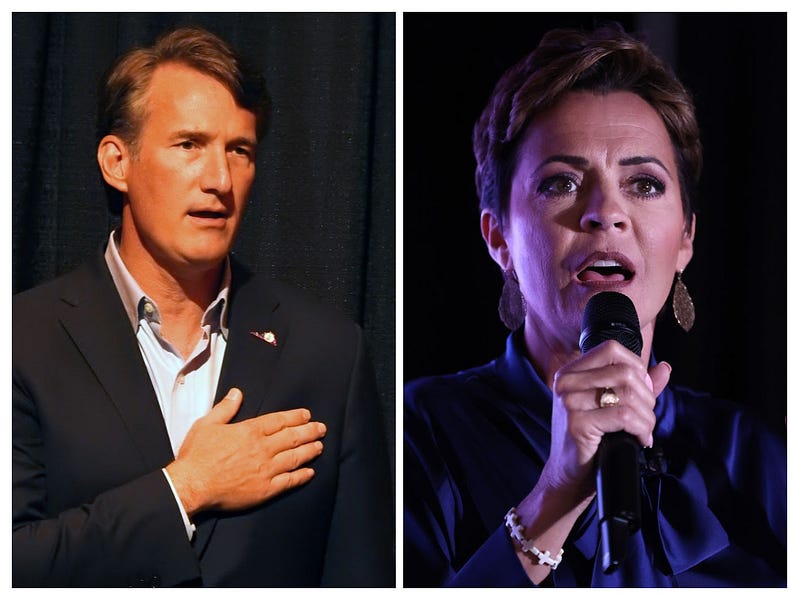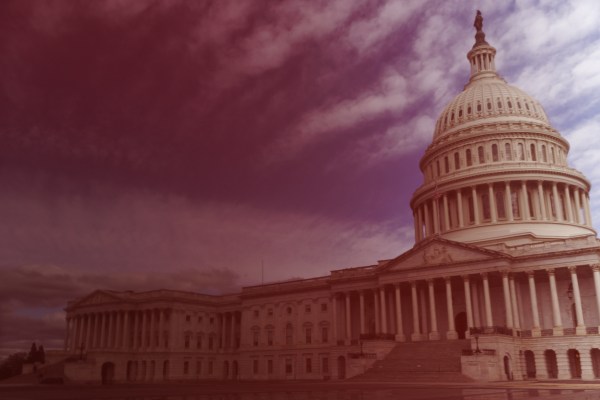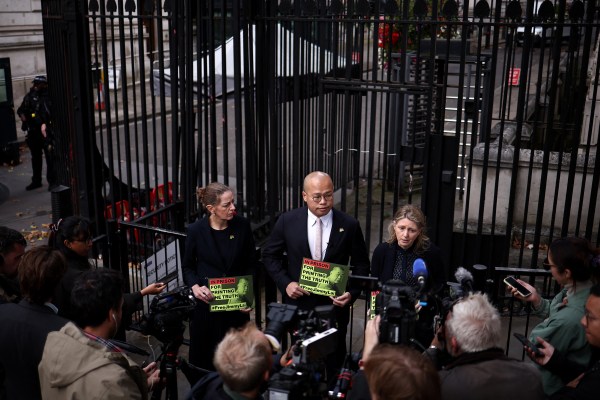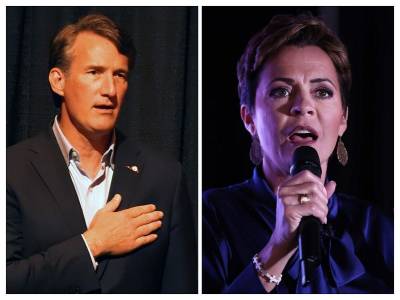Forgive a newbie for being presumptuous, but I’ve always suspected Dispatch readers trend pessimistic by nature. Chances are you’re here because you worry about the state of American governance, particularly its right wing, and can’t shake the sense that the wrinkles might not iron themselves out in the end this time.
Pessimism is a burden but it has its advantages. Because we’re inclined to expect the worst, we pessimists are rarely disappointed and often happily surprised. And we frequently get to indulge in a special pleasure unknown to others, the morbid joy that lies in crushing the naive hope of optimists.
Let’s indulge a bit together here.
For the last several days, anti-Trump optimists have touted new data suggesting that his influence over the GOP has never been weaker. “Just 33% of registered Republican voters in the new poll view themselves more a ‘supporter of Donald Trump’ over the Republican Party,” NBC reported. “By comparison, 58% say they view themselves as a ‘supporter of the Republican Party.’” That does sound hopeful—if one assumes that Trumpism and the wider party are meaningfully distinct, kooky populism on the one hand versus traditional conservatism on the other.
But increasingly there is no such distinction. Kooks and normies are converging to their mutual advantage.
The paradigm example of a normie Republican in the post-Trump era is Virginia Gov. Glenn Youngkin, a man who resembles Mitt Romney in mien, temperament, politics, and professional background far more than he does Donald Trump. Here’s what Youngkin is doing with his time this fall:
Virginia Gov. Glenn Youngkin is expected to stump for Arizona governor candidate Kari Lake next month, escalating his midterm campaign efforts ahead of a prospective 2024 presidential bid.
…
Lake will be the highest-profile, most MAGA-aligned candidate Youngkin has campaigned for to date. She has embraced Trump’s false claim the 2020 election was stolen, railed against Covid vaccine mandates and turned the media into a punching bag. Polls have shown her in a tight race with Democratic Secretary of State Katie Hobbs, in a state that was narrowly won by President Joe Biden.
He isn’t alone. Ron DeSantis has turned himself into a top-tier national figure by deftly straddling the populist-normie line over the last two years as governor of Florida. He’s also campaigning for Lake, as well as for Confederate cosplayer Doug Mastriano in Pennsylvania. Arizona Gov. Doug Ducey is the very model of a normie conservative Republican, having won office before Trump entered politics; he refused Trump’s demands to overturn Arizona’s election in 2020 and endorsed Lake’s center-right rival in this year’s GOP gubernatorial primary. But lately Ducey too has made his peace with supporting Lake, never mind that she’s one of the most addled election deniers on a ballot anywhere this fall in a field of very stiff competition.
The motives for backing Lake vary. DeSantis and Youngkin clearly have near-term presidential ambitions, whereas Ducey is chairman of the Republican Governors Association and may feel bound by partisan duty to support his party’s nominee in his home state. Whatever their reasons, though, the hard fact is that none of the three view an alliance with Lake as beyond the pale.
To the contrary. DeSantis and Youngkin have forged a sort of devil’s bargain with her: They lend her establishment legitimacy in the form of an official endorsement, and Lake lends them populist legitimacy by accepting it. Lake gets to point to their support to reassure swing voters in Arizona that she’s not as much of a crank as she’s cracked up to be. If she were, would mild-mannered Glenn Youngkin be campaigning for her? In turn, DeSantis and Youngkin get to reassure populist primary voters that their unwillingness to claim the 2020 election was rigged doesn’t mean they aren’t quietly pro-coup. If they weren’t, would fire-breathing Kari Lake be so eager for their endorsements?
The kooks and the normies are engaged in a sort of credibility swap, each leveraging their authority over their respective wing of the party to benefit the other. Which raises the question: If you’re one of the 58 percent who consider yourself more a supporter of the Republican Party than of Donald Trump, which Republican Party do you mean? The one in which Kari Lake is endorsed by Glenn Youngkin or the one in which Glenn Youngkin is endorsed by Kari Lake? How meaningful is that distinction?
Readers of a certain age will recall the old Reese’s commercials. The great philosophical question of whether he got chocolate in her peanut butter or she got peanut butter on his chocolate ultimately doesn’t matter. It’s the same flavor either way.
In some ways it’s been the same flavor for a while. Despite his reputation as an old-school Republican with whom suburbanites can feel comfortable, Youngkin had been shrewd about strategically associating himself with cranks long before he declared his interest in stumping for Lake. He had his former opponent, Lake-ish election denier Amanda Chase, campaign for him in Virginia after he won the gubernatorial nomination. He eagerly accepted Trump’s endorsement after the primary. And he refused to concede that Biden had won legitimately in 2020 until after he had become his party’s nominee, no-commenting initially when asked if he would have voted to certify the results had he been a member of Congress.
Earlier this year he appointed a former Chase top aide to be, of all things, Virginia’s new elections commissioner.
Last fall Youngkin crowed, presciently, that he would prevail in Virginia by bringing together “Forever-Trumpers and Never-Trumpers,” a strategy that now appears to extend to his presidential ambitions. And if pandering to “Forever-Trumpers” means anything, it means occasionally forging an unsavory strategic alliance. He campaigned last month in Michigan with the Republican nominee for governor, Tudor Dixon, a former election denier who also quickly moderated on the subject once she had her party’s nomination in hand. More recently he was up in Maine fundraising for populist Paul LePage and fielding awkward questions about some of LePage’s bon mots about race. Youngkin seems to have concluded that he needn’t mouth crankish platitudes himself to attract populist voters so long as he can rack up enough photo ops with politicians who do.
None of this is to suggest that he and Lake are political kindred spirits. One would certainly prefer to be governed by a cynic than by a crank since the former is apt to recognize moral and civic bounds that elude the latter. But the fact remains that Youngkin is leveraging his credibility with mainstream voters to normalize cranks in hopes of getting them elected, perversely helping to ensure the Trumpist wing of the party to which he doesn’t belong grows in influence.
He may be getting more than he bargained for in the process. Here’s a choice quote from Mark Finchem, the Republican Party’s nominee for secretary of state in Arizona, when asked by Time magazine whether he’d certify his state’s results in 2024 if Biden wins again:
Finchem chuckled. “If the law is followed, and legitimate votes have been counted, and Joe Biden ends up being the winner,” he told me, “I’m required under the law—if there’s no fraud—to certify the election.” But, he added, “I think you’re proposing something that, quite frankly, is a fantasy.”
Why, I asked him, was it so impossible to believe Biden won in Arizona, as many polls predicted and postelection reviews confirmed? “It strains credibility,” Finchem responded. “Isn’t it interesting that I can’t find anyone who will admit that they voted for Joe Biden?” Was it possible that lots of people he didn’t personally know had voted for Biden? “In a fantasy world, anything’s possible,” Finchem said.
I don’t know what Glenn Youngkin thinks of Finchem or whether his endorsement of Lake will extend down ballot in Arizona. But it’s inevitable that the stronger Lake performs on Election Day, the greater the odds that she’ll drag Finchem over the finish line with her. In the name of building goodwill with Republican populist voters, Youngkin is seemingly prepared to see a key swing state’s election machinery completely dominated by kooks willing to instigate a constitutional crisis to help Trump regain power. That’s what passes for “normie” in the party now.
The strategic problem for the GOP since 2015 is that, between the kook wing and the normie wing, only one is led by a figure willing to bring down the party if his side doesn’t get its way. Not to belabor a point from my first newsletter but Trump’s singular ruthlessness in prioritizing his personal interests over all else means the prospect of him bolting the party and taking a meaningful number of his supporters with him remains, and will remain, a mortal threat to the GOP’s national viability. The modern Republican Party is essentially a hostage crisis in which each wing could kill the party by bolting the coalition but only one wing is willing to do it and both sides know it. Mitch McConnell would prefer to see the GOP control all of government even if it means that his enemies within the party get to wield most of the power. The same simply isn’t true of Trump. From that asymmetry flows the entirety of MAGA’s leverage, the abiding fear that he and his fans will doom Republicans to defeat in elections across the map for the foreseeable future by withholding their votes if normies refuse to help them build influence.
Figures like McConnell and Youngkin acquiesce to that fear because, I suspect, they believe doing so is the only way to avoid a serious schism on the right. But the schism is already here. When you’re being held hostage by a captor whom you have good reason to think is willing to shoot, I dare say the situation already amounts to an irreparable fracture of the relationship.
A few days ago New York Times columnist Jamelle Bouie compared the Democratic Party’s divorce from the Dixiecrats decades ago to the dilemma currently facing the GOP. Democrats were free to shed themselves of segregationist voters, Bouie argued, because there was another sizable voting bloc available to replace them, namely, African-Americans. The modern Republican Party can’t emulate that example because “there is no large and pivotal group of Republicans who can exert [similar] cross-pressure on MAGA voters,” Bouie wrote. That may be true. The right’s populist wing is big enough as to likely be irreplaceable in the near term if it balks. There aren’t enough suburbanites to fill the ranks vacated by missing Trump voters if the cult leader informs them that the GOP has become uninhabitable because of serial “disloyalty.”
The bold move by normies like Youngkin and McConnell, and the healthy one for the party long-term, would be to call Trump’s bluff and let the chips fall where they may. Instead of endorsing Kari Lake, if Youngkin, DeSantis, and Ducey declared her unfit for office because of her election denialism, that cue to center-right voters might be enough to sink her in the general election. The consequences would be severe—Democrats would flip an important gubernatorial seat and Trumpers would vow revenge for the sabotage of a beloved populist—but it would, at last, give both sides leverage in the ongoing hostage standoff. It would establish the principle that conspiracy theorists were nonstarters as party nominees; if the kook wing deemed that standard unacceptable and undertook to quit the party, that would be their right. But it would also mean Democratic governance at the national level and in all state battlegrounds so long as the boycott proceeded. How long would righty populists hold out under those circumstances?
The only way to rid the party of nuts, at least at the level of candidate selection, is for normies to render them unviable in general elections. The insanity will not stop until the sane remnant gives it a reason to stop by withholding its own votes in protest, at whatever cost. Every alternative strategy is wishful thinking. An idle hope that Trump belatedly loses interest in politics or chokes on a cheeseburger is not a strategy.
What makes Glenn Youngkin campaigning for Kari Lake so dispiriting is that it has the feel of a capitulation, never mind that Youngkin has been strategically capitulating to the kook wing to his own advantage for more than a year. If even the party’s most Romney-esque newcomer can’t muster neutrality, at a minimum, when asked to choose between an autocrat and a Democrat in Arizona, then the distinction between normies and the rest of the party feels functionally meaningless. Some candidates may give you a little more chocolate and some may give you a bit more peanut butter, but from now on you’ll always be getting some of both. You can tell a pollster that you support the GOP more than you support Trump but increasingly you’re supporting the same thing.
And you too may be getting more than you’ve bargained for. Others have noted recently that Trump’s already considerable kookery appears to be metastasizing, but isn’t that a natural consequence of the normie wing continuing to lower its standards for what constitutes disqualifying behavior? If Kari Lake babbling about the stolen election is no bar to her earning Glenn Youngkin’s endorsement, Trump might reasonably conclude that letting his freak flag fly with QAnon will pose no problem in a 2024 primary. Who’s going to call him on it? Certainly not Youngkin or Ron DeSantis. And once the nomination is his, the normies who otherwise blanch at conspiracy theorizing will conclude that they have no choice but to vote for him anyway. Better the autocrat than the Democrat, ever and always.







Please note that we at The Dispatch hold ourselves, our work, and our commenters to a higher standard than other places on the internet. We welcome comments that foster genuine debate or discussion—including comments critical of us or our work—but responses that include ad hominem attacks on fellow Dispatch members or are intended to stoke fear and anger may be moderated.
With your membership, you only have the ability to comment on The Morning Dispatch articles. Consider upgrading to join the conversation everywhere.